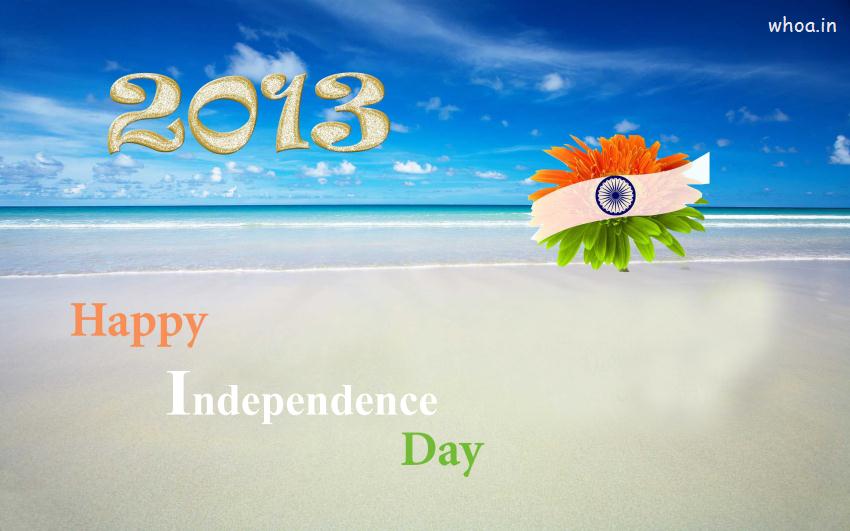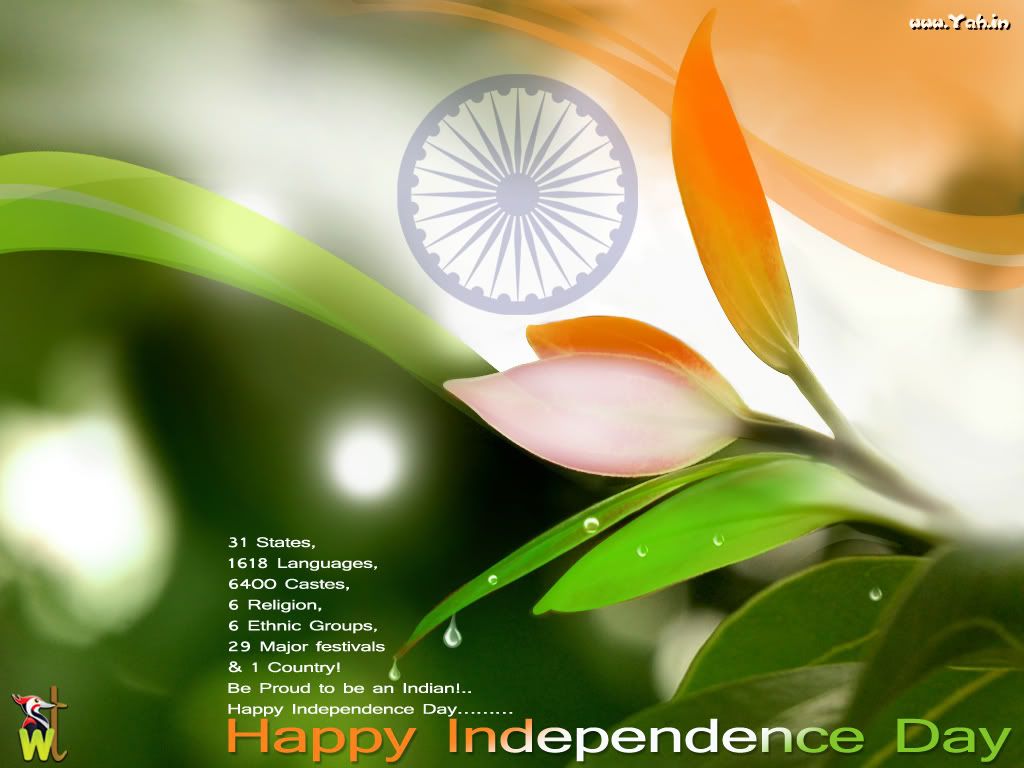Independence Day of India 15th August HD Wallpaper Wishes Greetings Quotes SMS
Independence Day of India Quotes SMS HD Wallpaper Wishes Greetings
67th Independence Day India 15th August 2013 Quotes SMS Wallpaper Wishes Greetings
Independence Day India August 15 Wishes Greetings Quotes SMS Wallpaper
India Independence Day August 15 Greetings Wishes Quotes SMS Wallpaper
HAPPY INDEPENDENCE DAY TO ALL INDIANS.
The
world's largest democracy and second most populous country India is
celebrating its 67th Independence Day on 15/08/2013. The day commemorate
political independence from of the nation from the British rule on
15th August 1947 and that independence is celebrated every year,
although in a much more subdued form than on Republic Day.
Independence Day Culture
On Independence Day and Republic Day, patriotic songs in Hindi and regional languages are broadcast on television and radio channels. They are also played alongside flag hoisting ceremonies. Patriotic films are broadcast. Over the decades, according to The Times of India, the number of such films broadcast has decreased as channels report that audiences are over saturated with patriotic films.The population cohort that belong to the Generation Next often combine nationalism with popular culture during the celebrations. This mixture is exemplified by outfits and savouries dyed with the tricolor and designer garments that represent India's various cultural traditions.Retail stores offer Independence Day sales promotions. Some news reports have decried the commercialism.
Indian Postal Service publishes commemorative stamps depicting independence movement leaders, nationalistic themes and defence-related themes on 15 August.Independence and partition inspired literary and other artistic creations in many languages. Such creations mostly describe the human cost of partition, limiting the holiday to a small part of their narrative.
Salman Rushdie's novel Midnight's Children (1980), which won the Booker Prize and the Booker of Bookers, wove its narrative around children born at midnight of 14–15 August 1947 with magical abilities. Freedom at Midnight (1975) is a non-fiction work by Larry Collins and Dominique Lapierre that chronicled the events surrounding the first Independence Day celebrations in 1947.
Few films center on the moment of independence, instead highlighting the circumstances of partition and its aftermath.On the Internet, Google has commemorated Independence Day since 2003 with a special doodle on its Indian homepage.
Independence Day History
European traders had established outposts on the Indian subcontinent by the 17th century. Through overwhelming military strength, the British East India company subdued local kingdoms and established themselves as the dominant force by the 18th century.Following the Rebellion of 1857, the Government of India Act 1858 led the British Crown to assume direct control of India. In the decades following, civic society gradually emerged across India, most notably the Indian National Congress, formed in 1885.
The period after World War I was marked by British reforms such as the Montagu–Chelmsford Reforms, but it also witnessed the enactment of the repressive Rowlatt Act and calls for self-rule by Indian activists. The discontent of this period crystallized into nationwide non-violent movements of non-cooperation and civil disobedience, led by Mohandas Karamchand Gandhi.
During the 1930s, reform was gradually legislated by the British; Congress won victories in the resulting elections. The next decade was beset with political turmoil: Indian participation in World War II, the Congress's final push for non-cooperation, and an upsurge of Muslim nationalism led by the All-India Muslim League. The escalating political tension was capped by Independence in 1947. The jubilation was tempered by the bloody partition of the subcontinent into India and Pakistan.
Partition and independence
15 August 1947 day's programme
8.30 am Swearing in of governor general and ministers at Government House9.40 am Procession of ministers to Constituent Assembly
9.50 am State drive to Constituent Assembly
9.55 am Royal salute to governor general
10.30 am Hoisting of national flag at Constituent Assembly
10.35 am State drive to Government House
6.00 pm Flag ceremony at India Gate
7.00 pm Illuminations
7.45 pm Fireworks display
8.45 pm Official dinner at Government House
10.15 pm Reception at Government House
Millions of Muslim, Sikh, and Hindu refugees trekked across the newly drawn borders in the months surrounding independence. In Punjab, where the borders divided the Sikh regions in halves, massive bloodshed followed; in Bengal and Bihar, where Mahatma Gandhi's presence assuaged communal tempers, the violence was mitigated. In all, between 250,000 and 1,000,000 people on both sides of the new borders died in the violence. While the entire nation was celebrating the Independence Day, Gandhi stayed in Calcutta in an attempt to stem the carnage. On 14 August 1947, the Independence Day of Pakistan, the new Dominion of Pakistan came into being; Muhammad Ali Jinnah was sworn in as its first Governor General in Karachi.
The Constituent Assembly of India met for its fifth session at 11 pm on 14 August in the Constitution Hall in New Delhi. The session was chaired by the president Rajendra Prasad. In this session, Jawaharlal Nehru delivered the Tryst with Destiny speech proclaiming India's independence.
“ Long years ago we made a tryst with destiny, and now the time comes when we shall redeem our pledge, not wholly or in full measure, but very substantially. At the stroke of the midnight hour, when the world sleeps, India will awake to life and freedom. A moment comes, which comes but rarely in history, when we step out from the old to the new, when an age ends, and when the soul of a nation, long suppressed, finds utterance. It is fitting that at this solemn moment, we take the pledge of dedication to the service of India and her people and to the still larger cause of humanity.
” —Tryst with Destiny speech, Jawaharlal Nehru, 15 August 1947[22]
The members of the Assembly formally took the pledge of being in the service of the country. A group of women, representing the women of India, formally presented the national flag to the assembly.
The Dominion of India became an independent country as official ceremonies took place in New Delhi. Nehru assumed office as the first prime minister, and the viceroy, Lord Mountbatten, continued as its first governor general. Gandhi's name was invoked by crowds celebrating the occasion; Gandhi himself however took no part in the official events. Instead, he marked the day with a 24-hour fast, during which he spoke to a crowd in Calcutta, encouraging peace between Hindu and Muslim.

































No comments:
Post a Comment